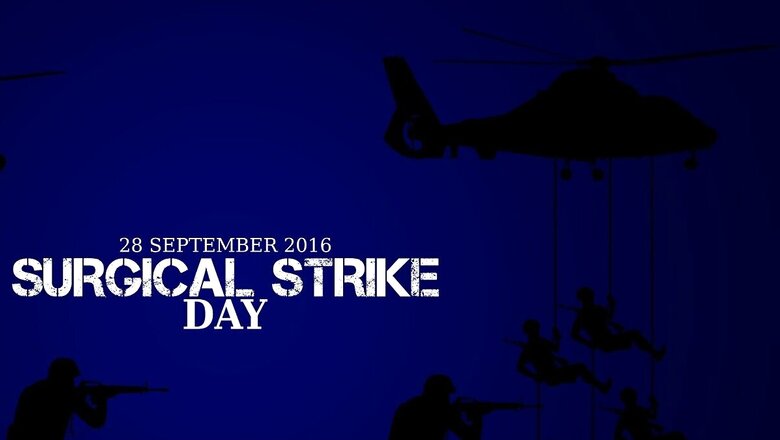
views
SURGICAL STRIKE DAY 2023: Today, September 28 marks the seventh anniversary of Surgical Strike Day. It was on this day in 2016, the Indian Army conducted surgical strikes on terrorist camps across the Line of Control (LoC) in Pakistan-occupied Kashmir (PoK). The strikes were a response to the Uri attack, in which 20 Indian soldiers were killed by Pakistan-backed terrorists on September 18.
The Indian government decided to celebrate September 28 as Surgical Strike Day, commemorating India’s befitting reply to Pakistan-sponsored terrorism. The strikes were a bold and decisive move by India, and they sent a strong message to Pakistan that India would not tolerate cross-border terrorism. The strikes also boosted the morale of the Indian security forces and the Indian people.
The surgical strikes were a watershed moment in India-Pakistan relations. They marked a significant escalation in the conflict between the two countries, and they have had a lasting impact on the region.
Here’s a closer look at the surgical strikes, including the events leading up to them, how they were carried out, and their impact.
THE URI ATTACK
On September 18, 2016, heavily armed terrorists of the Pakistan-based Jaish-e-Mohammed (JeM) attacked an army base in Uri, Kashmir. The terrorists entered the base at around 5:30 am and opened fire on the soldiers. The attack lasted for several hours, and it left 20 Indian soldiers dead.
The Uri attack was one of the deadliest attacks on the Indian Army in recent years. It was also a major setback for India’s efforts to improve relations with Pakistan.
THE SURGICAL STRIKES
In response to the Uri attack, the Indian government decided to conduct surgical strikes on terrorist camps in PoK. The strikes were carried out by special forces of the Indian Army on September 28, 2016.
The Indian Army Special Forces platoons were dropped inside the LoC and crossed over by foot at midnight on September 28 into their targets. The targets included terrorist launchpads in the Neelam Valley, the Poonch sector, and the Uri sector.
The Indian Army destroyed multiple terrorist launchpads in the strikes, and they also caused significant casualties among the terrorists, including senior commanders.
The surgical strikes were a success, and they sent a strong message to Pakistan that India would not tolerate cross-border terrorism. The strikes also boosted the morale of the Indian security forces and the Indian people.
SIGNIFICANCE OF THE SURGICAL STRIKES
The surgical strikes were a watershed moment in India-Pakistan relations. They marked a significant escalation in the conflict between the two countries, and they have had a lasting impact on the region.
The surgical strikes also showed that India was willing to take on Pakistan militarily, even if it meant risking a wider conflict. This was a major shift in India’s foreign policy, and it has had a profound impact on the region.
IMPLICATIONS OF THE SURGICAL STRIKES
The surgical strikes have had a significant impact on India-Pakistan relations and the region as a whole. They have led to an increase in tensions between the two countries, and they have made it more difficult to resume dialogue and peace talks.
The surgical strikes have also had a negative impact on the security situation in the region. There has been an increase in cross-border firing and skirmishes between the two countries since the strikes.
The surgical strikes were a bold and decisive move by India, but they have had a number of negative consequences. They have led to an increase in tensions between India and Pakistan, made it more difficult to resume dialogue and peace talks, and had a negative impact on the security situation in the region.
QUOTES RELATED TO THE SURGICAL STRIKES
- “The Indian Army has carried out surgical strikes on terror camps across the LoC. The strikes were successful and have caused significant casualties among the terrorists.” – Prime Minister Narendra Modi.
- “The surgical strikes were a befitting reply to Pakistan for its sponsorship of terrorism. India will not tolerate cross-border terrorism.” – Manohar Parrikar, the then Defence Minister.
- “The surgical strikes were a major diplomatic victory for India. They have isolated Pakistan on the international stage.” – Sushma Swaraj, the then Foreign Minister.
- “The surgical strikes were a success. They have dealt a major blow to Pakistan-sponsored terrorism.” – Dalbir Singh Suhag, the then Army Chief General.




















Comments
0 comment